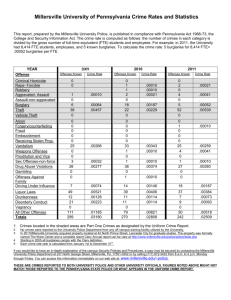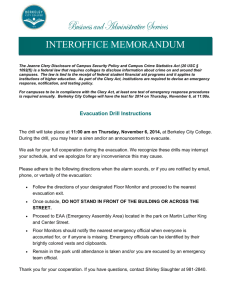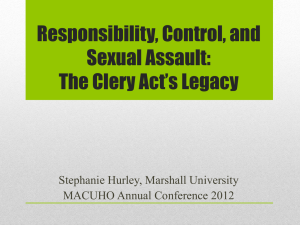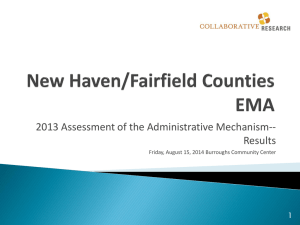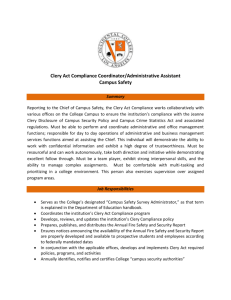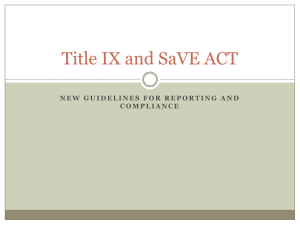Timely Warning Policy - Millersville University
advertisement
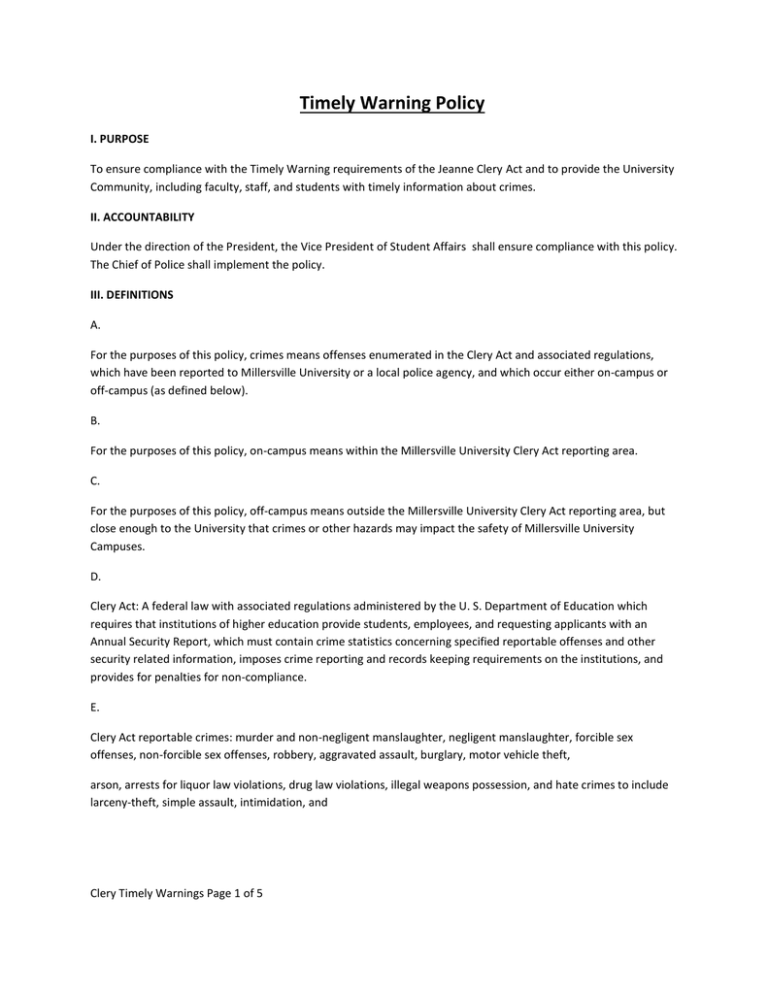
Timely Warning Policy I. PURPOSE To ensure compliance with the Timely Warning requirements of the Jeanne Clery Act and to provide the University Community, including faculty, staff, and students with timely information about crimes. II. ACCOUNTABILITY Under the direction of the President, the Vice President of Student Affairs shall ensure compliance with this policy. The Chief of Police shall implement the policy. III. DEFINITIONS A. For the purposes of this policy, crimes means offenses enumerated in the Clery Act and associated regulations, which have been reported to Millersville University or a local police agency, and which occur either on-campus or off-campus (as defined below). B. For the purposes of this policy, on-campus means within the Millersville University Clery Act reporting area. C. For the purposes of this policy, off-campus means outside the Millersville University Clery Act reporting area, but close enough to the University that crimes or other hazards may impact the safety of Millersville University Campuses. D. Clery Act: A federal law with associated regulations administered by the U. S. Department of Education which requires that institutions of higher education provide students, employees, and requesting applicants with an Annual Security Report, which must contain crime statistics concerning specified reportable offenses and other security related information, imposes crime reporting and records keeping requirements on the institutions, and provides for penalties for non-compliance. E. Clery Act reportable crimes: murder and non-negligent manslaughter, negligent manslaughter, forcible sex offenses, non-forcible sex offenses, robbery, aggravated assault, burglary, motor vehicle theft, arson, arrests for liquor law violations, drug law violations, illegal weapons possession, and hate crimes to include larceny-theft, simple assault, intimidation, and Clery Timely Warnings Page 1 of 5 destruction/damage/vandalism of property if the victim was intentionally selected because of the victim’s actual or perceived race, gender, religion, sexual orientation, ethnicity, or disability. F. Emergency notification: if there is an immediate threat to life, health, or safety of students or employees occurring on-campus, whether related to a crime or other hazard, the University will issue an emergency notification, the procedures and protocols for which are found in the University’s Emergency Communication Procedure. IV. REFERENCES A. Annual Security Report B. Clery Act C. Clery Act Regulations 34 CFR § 668.46 D. Emergency Response and Evacuation Procedures V. POLICY A. Requirement: Under the requirements of the Jeanne Clery Act, the University must provide faculty, staff, and students with timely warnings about reported crimes, occurring on or off-campus which in the professional judgment of the Chief of Police or designee, constitute a serious, ongoing, or continuous threat. All members of the University community are encouraged to report any crime or hazard to the Millersville University Police as soon as possible after the incident. Timely warnings may be made about any serious crimes, whether reportable under the provisions of the Clery Act or not. B. Responsibilities: The Chief of Police or designee is responsible for: a. Determining whether or not the situation actually poses a threat to the University Community, and making the decision to issue timely warnings on a case-by-case basis, considering factors such as the nature of the threat, the continuing hazard to the University community, and the possible risk of compromising law enforcement efforts. Clery Timely Warnings Page 2 of 5 b. Issuing timely warnings to faculty, staff, and students on the involved campus (es) as soon as possible after pertinent information about the threat becomes available. c. As appropriate, notifying the Vice President for Student Affairs, and/or other University administrators about crimes and timely warnings. d. Summoning the necessary resources to mitigate, investigate, and document any serious crime occurring oncampus. e. Interacting with other local law enforcement agencies to obtain information about crimes occurring off-campus and to help ensure that such crimes are mitigated, investigated, and documented by the local law enforcement agency. VI. PROCEDURE A. Methods of Distribution Timely warnings will be distributed via some or all of the mechanisms listed below, or any other appropriate means. The list is not prioritized or ranked, the Chief of Police or designee will determine the most appropriate means to distribute the message based on the information being disseminated, segment(s) of the University Community being notified and other related factors. 1. Text messaging to cell phones or e-mail. Registration required (see Attachment Registration Procedure below) 2. E-mail from: millersville.edu 3. Postings on campus buildings Clery Timely Warnings Page 3 of 5 4. University Police Web site (intranet) : http://www.millersville.edu/police/police/stats.php 5. Media releases/press conferences B. Information included in Timely Emergency Notifications Timely Emergency Notifications will include at minimum: 1. A short description of the incident or type of crime, including date, location, and time of occurrence. 2. A physical description of the suspect, if available, including gender and race. 3. A composite drawing or photograph of the suspect, if possible. 4. Gender of the victim(s), if appropriate. 5. Injury sustained by the victim(s), if appropriate. 6. Date and time the notice was released. 7. A warning to the campus community to exercise caution. Clery Timely Warnings Page 4 of 5 VII. EXHIBIT Emergency Notification Registration Procedure (text/email messaging): 1. Go to Web page: http://www.millersville.edu/safetyandsecurity/index.php 2. Under MU Alert, click on the highlighted Emergency Alerts or Cell Phone to register for Text messages and Email emergency notifications Clery Timely Warnings Page 5 of 5
